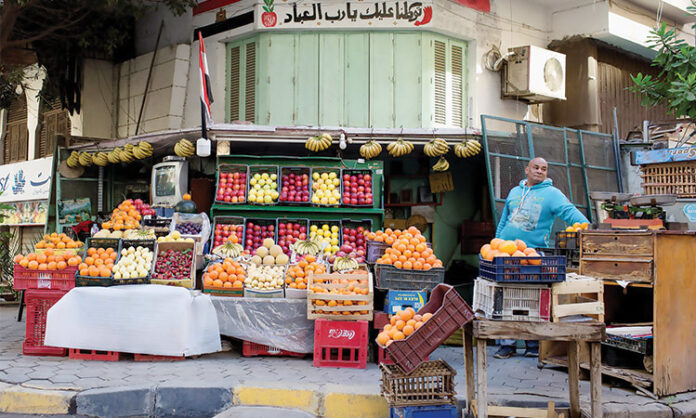Egypt’s year-on-year headline inflation rose to a record 35.7 per cent in June from 32.7 per cent in May, official data showed on Monday, accelerating past the previous high reached in 2017 and reflecting acute economic strains since early last year.
Prices soared as Egypt has struggled through a shortage of foreign currency and repeated devaluations since March 2022, increasing hardships for many Egyptians who have seen their living standards eroded in recent years.
“All we hear about is inflation,” said Wafaa Youssry, a 40-year-old Uber driver from Cairo, who said she no longer had enough money to send her children to private schools despite her husband moving to Kuwait for better pay. “It’s forced me to think creatively because there aren’t enough jobs here that pay decent salaries.”
Analysts had forecast the record reading for annual urban consumer price inflation in June, citing an unfavourable base effect and an increase in consumer demand over the annual Eid al-Adha holiday.
The continuing surge in inflation may increase pressure on Egypt’s central bank to raise interest rates at its next scheduled meeting on Aug.3. The bank has held rates steady in its last two meetings, after raising them by a total of 1,000 basis points since March 2022.
Increases in electricity tariffs, which the government has deferred in an effort to soften the impact of inflation, could reinforce price pressures through the summer.
“Assuming we see power tariffs being hiked in July, annual inflation could remain high for a longer duration,” said Allen Sandeep of Naeem Brokerage.
“Without the power tariff hike, we might see some cooling off in July because of the favourable base year.”
Egypt, the Arab world’s most populous nation, has devalued its currency by about half since March 2022 after the fallout from Russia’s invasion of Ukraine exposed its economic vulnerabilities and prompted it to seek assistance from the International Monetary Fund under a $3 billion loan deal.
The first review of the programme has been delayed amid uncertainty over Egypt’s pledge to move to a flexible exchange rate.
The previous headline inflation record of 32.95 per cent was reached in July 2017, eight months after Egypt devalued its currency by half as part of a previous IMF package.
Meanwhile Egypt’s non-oil private sector economy remained under pressure at the end of the second quarter, with the PMI once again signalling a deterioration in business conditions.
That said, both output and new orders fell at weaker rates, pushing the headline index up to a 22-month high to signal only a marginal decline since May. Meanwhile, inflationary pressures eased slightly and remained much softer than the peaks seen in January. However, the level of employment dipped for a seventh consecutive month in June amid subdued confidence towards the 12-month outlook.In fact, the level of optimism was the second-lowest on record.
The headline seasonally adjusted S&P Global Egypt Purchasing Managers’ Index (PMI) – a composite gauge designed to give a single-figure snapshot of operating conditions in the non-oil private sector economy – remained below the critical 50.0 level that separates improvement from deterioration. That said, the Purchasing Managers’ Index rose from 47.8 in May to 49.1 in June, its highest level since August 2021 and indicative of a decline that was only marginal overall.
Output across Egypt’s non-oil private sector continued to fall in June. According to panel member reports, price pressures, liquidity issues and weak demand drove total business activity volumes lower at the end of the second quarter.
That said, the rate of decline was the weakest seen in 21 months and only slight overall. June survey data indicated a softer downturn in demand conditions.
Although total intakes of new work fell, the rate of decrease was the softest since December 2021. Whilst high prices and subdued economic conditions reportedly weighed on sales performances, some companies saw an uplift in certain parts of the market.
Joe Hayes, Principal Economist at S&P Global Market Intelligence, said: “The Egypt PMI retained its upward momentum in June, rising closer to the critical 50.0 threshold that marks stabilisation. At 49.1, the index reached its highest level for almost two years. Behind June’s sustained uplift in the PMI were output and new orders, which similarly showed rates of decline softening amid reports from some survey members that demand conditions were beginning to show greenshoots of recovery.
“An easing of inflationary pressures will also be welcomed. After the steep price increases seen at the start of the year, fewer companies are reporting such high cost pressures.



















